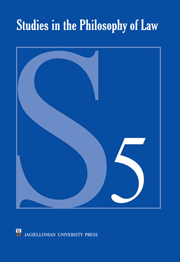Book contents
- Frontmatter
- Contents
- Preface
- I Legal Implications of Medical Advances
- II Evolutionary Approach to the Normativity of Law
- 5 Some Remarks on the Naturalization of Law
- 6 Revisiting ‘Equality in Exchange Revisited’: Contemporary Evolutionary (Genetic and Cultural) Approaches to Human Behaviour and the Normativity of Law
- 7 Legal Positivism and Evolutionary Psychology: Can Legal Positivists Learn Something from Darwin?
- 8 Neurolaw. A New Paradigm in Legal Philosophy
- 9 The Question of Non Human Primates Morality
- 10 Animals as Moral Agents
- III Appendix
- About the Authors
8 - Neurolaw. A New Paradigm in Legal Philosophy
from II - Evolutionary Approach to the Normativity of Law
Published online by Cambridge University Press: 05 September 2014
- Frontmatter
- Contents
- Preface
- I Legal Implications of Medical Advances
- II Evolutionary Approach to the Normativity of Law
- 5 Some Remarks on the Naturalization of Law
- 6 Revisiting ‘Equality in Exchange Revisited’: Contemporary Evolutionary (Genetic and Cultural) Approaches to Human Behaviour and the Normativity of Law
- 7 Legal Positivism and Evolutionary Psychology: Can Legal Positivists Learn Something from Darwin?
- 8 Neurolaw. A New Paradigm in Legal Philosophy
- 9 The Question of Non Human Primates Morality
- 10 Animals as Moral Agents
- III Appendix
- About the Authors
Summary
Introduction
The main goal of this work is to present the issues connected with a new field of interdisciplinary study – neurolaw. Neurolaw is an emerging field that focuses on the potential for neuroscientific achievements to influence legal science. The structure of argumentation will be as follows: firstly, I will discuss some metatheoretical questions before presenting some of the practical and philosophical consequences of the applications of new science to legal reality. One of the goals of this work will be to demonstrate that changes in legal philosophy are strongly connected with the practical side of legal science and, conversely, when we modify legal practice through neuroscientific achievements it has an impact on legal theory and philosophy. This is especially so when it comes to philosophical issues since it may change our understanding (or manner of interpretation) of basic legal principles.
That is to say, this work is not a full description of the actual state of research in neurolaw. The purpose of it, and the real reason for writing this article, is to show the dimensions of changes in legal sciences thanks to the rapid development of neuroscience. In other words, it is a presentation of the ways in which we can be a witness to the naturalization of normative science. We will start our analysis from a discussion of some meta-theoretical questions.
- Type
- Chapter
- Information
- Studies in the Philosophy of LawLaw and Biology, pp. 125 - 134Publisher: Jagiellonian University PressPrint publication year: 2010

